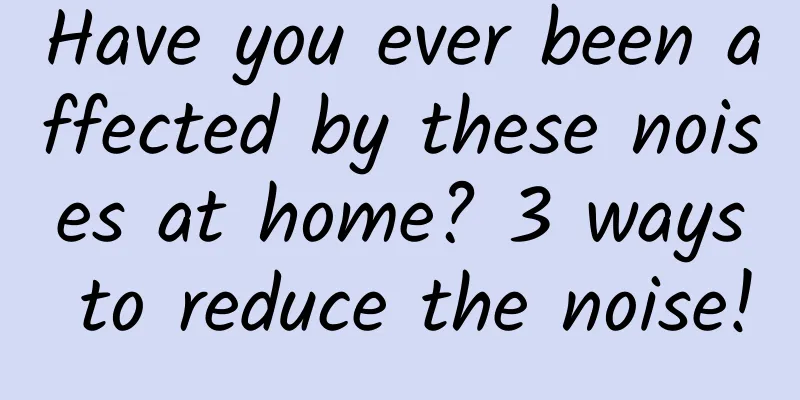Have you ever been affected by these noises at home? 3 ways to reduce the noise!

|
It’s so noisy! This is probably our most direct and real reaction to noise. In 1910, Robert Koch, a famous German physician and Nobel Prize winner in Physiology or Medicine, also said: "One day mankind will fight fiercely against noise, just like fighting cholera and plague." Now it seems that he was right. We are always exposed to various kinds of noise in our daily lives. Many studies have shown that noise has a negative impact on physical and mental health. Therefore, in order to enhance awareness of noise pollution, April 16th of each year has been designated as World Noise Day since 2003. Today we will talk about the harm caused by noise, what kind of noise is around us and how to deal with it. 01 Noise, a soft knife that hurts people Although noise is invisible and intangible, it can penetrate everywhere and hurt people invisibly. The first is the "hard damage" to hearing. In the past, many blacksmiths were hard of hearing. This was because they worked all day long and were always in a noisy environment. The auditory hair cells in the ears would lose their sensitivity, and over time, their hearing would decline. In addition, the noise from various machines in many factories running at full capacity is not small. If you don't wear earmuffs, your hearing will also decline. Sudden loud noises, such as explosions and collisions, can also damage the ears and cause temporary or even permanent deafness. There are also some low-frequency noises that can even directly affect the internal organs. In addition, noise can also cause some "soft damage". We may all have had this experience: we are more likely to be restless and irritable in a noisy environment. This is not an illusion. Noise not only hurts the ears, but also causes a series of adverse reactions to our body and mind, such as insomnia, headaches, nausea, irritability, lack of concentration, etc. What are the hazards of noise related to? One of the most important factors is, of course, volume. It is completely consistent with common sense that the louder the noise, the more harmful it is. To measure whether a sound is loud or not, we often have to use a unit called decibel (written as dB). For example, we often hear that when the noise level reaches 160dB, people will feel unbearable pain or even faint; the noise of a jet plane taking off can reach 120dB; sounds above 85dB can cause irreversible damage to the ears; in a quiet park environment, there is 40dB, and so on. We also need to remind everyone here that decibel is not an intuitive unit like kg or ml. For every 3 decibel increase, the sound pressure doubles, but our ears are usually not very sensitive to this mere 3 decibel change. Knowing this, we should be more restrained when adjusting the volume. In addition to volume, the type of noise also affects our perception. For example, the harsh noise of a metal processing plant is more maddening than the deafening music at a music festival. For many people, white noise at a moderate volume helps calm their mood. 02 Noise lurks in our homes When we talk about noise, we often think of bustling streets and busy factories. But in fact, there is often noise pollution in our own homes, and we often find it difficult to detect. One of the main reasons is that people have a strong ability to adapt. Many regular noises, such as computer case fans, air conditioners, refrigerators, etc., may seem a bit noisy at first, but after running for a long time, we will automatically ignore them and do what we need to do. However, if the volume is too high, it will still be harmful to health in the long run. Some noises are relatively hidden. For example, noises below 500Hz are called low-frequency noises. On the one hand, such noises are not easy to be heard by people. On the other hand, such noises have strong transmission power and can cause impacts without being very loud. Common noises such as elevator operation, air conditioning refrigeration, water pumps and other equipment may cause low-frequency noises, which can be alleviated by adding shock-absorbing measures. In addition, although beautiful music should not be considered noise according to the strict definition, if we listen to music, especially when using headphones or earphones, the volume is too high, which can still damage our hearing. In addition, the volume of many musical instruments is also very considerable when they are played at full capacity, which may cause noise pollution. 03 Noise can be reduced in this way If you want to reduce the noise at home, there are actually three most practical ways: ① Weaken the sound source ②Isolation of transmission ③Plugging your ears... Most of the noise sources in our homes are home appliances. If you want to reduce the noise they make, you can first compare prices and choose the ones with low working noise. The same type of equipment usually has low power and low noise. For example, the air conditioner used in the bedroom can be selected with a lower power, so that the noise is also low when working and will not disturb your sleep. Equipment with fans, such as computers, range hoods, electric fans, air conditioners, etc., may accumulate dirt and increase noise over time, so we need to clean them regularly. In addition, many home appliances have an acceptable volume when they are working normally, but they may malfunction after a long period of use, causing the noise volume to increase significantly. This is especially common with refrigerators and washing machines. In this case, we must send them for repair in time to reduce the noise and avoid damage. Of course, some noise may come from neighbors or outdoors. On the one hand, we can soundproof the doors, windows and walls. On the other hand, we can find the cause to see if the noise exceeds the standard so that we can communicate well. Noise detection requires professional equipment and operations, but now there are many mobile phone apps that can measure decibels, which can give us a rough reference. If you want to reduce the harm of noise, there is one last trick, which is to use noise reduction equipment, such as mainstream active noise reduction headphones. Turning on noise reduction can reduce noise by nearly 30 decibels, and in-ear memory foam noise-isolating earplugs can also effectively block noise. Author|Dingzhong popular science author Review | Pang Yufeng, deputy chief physician of ENT department, Shanghai Fifth People's Hospital |
Recommend
Carcinogenic? Loss of nutrients? Air fryers are in trouble...
◎ Comprehensive report by Wang Yu of Science and ...
Detailed explanation of adapter mode and application scenarios of Android design pattern
[[417879]] Preface Design patterns are sometimes ...
Looking at the WeChat Open Class H5 that has been all over the circle of friends from an operational perspective, do you really know how to do a year-end inventory?
WeChat was officially released on January 21, 201...
Interpretation of the 2018 Mobile App Advertising Data Year-end Report!
Public data shows that global mobile application ...
How to systematically design online and offline brand activities?
Different from daily operational activities, offl...
Weilai Li Bin sent an internal letter, in order to improve operational efficiency, 1,200 employees will be laid off
On August 22, Li Bin, founder, chairman and CEO o...
How to buy special government bonds during the epidemic? What are the ways to purchase the 2020 special anti-epidemic government bonds?
On June 15, the Ministry of Finance issued an ann...
A brief introduction to MVP's practical exercises to make the code structure simpler~
Preface To be honest, I haven't updated my bl...
Why did Volkswagen pay a huge compensation of 14.7 billion US dollars? Was it their own fault or was it slaughtered?
In fact, the basic framework of compensation had ...
What should be done at each stage of event promotion? You may wish to refer to my experience summary
Essay competitions, regardless of their form, are...
Tips for preventing malicious clicks in SEM promotion!
Those of us who do SEM promotion know that each k...
How to activate the mini program? How to activate WeChat Mini Program?
On January 9, 10 years ago, Jobs released the fir...
China Automobile Dealers Association: US auto market bounced in May 2020
“America’s auto dealers are getting people back t...
Why is there no winner in long-term gambling? You need to understand the "Gambler Loses All Principle"
Why not gamble? This question needs to be discuss...
How to effectively place Guangdiantong information flow advertisements?
How to effectively place Guangdiantong informatio...









